ASSIGNMENTS
Introduction: World War II and Film as Propaganda
"Know your Enemy: Japan" (Frank Capra, 1945)
Optional Readings:
Shimizu Akira, "War and Cinema in Japan" (The Japan/America Film Wars 7-57)
Ueno Toshiya, "The Other and the Machine" (The Japan/America Film Wars 71-93)
Susan Hayward, "Defining the 'National' of a Country's Cinematographic Production" (French National Cinema 1-16)
Donald Richie, "A Definition of the Japanese Film" (A Lateral View 170-84)
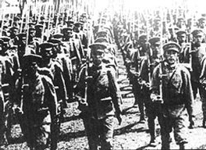
World War II and Film as Reflection
"Fires on the Plain" (Ichikawa Kon, 1959)
Optional Readings:
William B. Hauser, "Fires on the Plain: The Human Cost of the Pacific War" (Reframing 193-209)
Pauline Kael, "Fires on the Plain (Nobi)" (Kon Ichikawa 401-404)
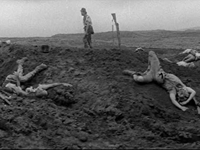
Wartime Atrocities and a Discourse of Victimization
"Black Rain" (Imamura Shôhei, 1989)
Optional Readings:
Michael Kort, "Key Questions and Interpretations" (The Columbia Guide to Hiroshima and the Bomb 81-116)
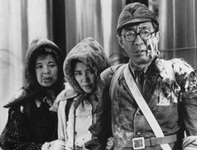
Fears of a Nuclear Modernity
"Godzilla" (Honda Ishirô, 1954)
Optional Readings:
Yomota Inuhiko, "The Menace from the South Seas" (Japanese Cinema: Texts and Contexts 102-111)
Mark Anderson, "Mobilizing Gojira: Mourning Modernity as Monstrosity" (In Godzilla's Footsteps 21-40)

Ozu Yasujirô: Part I
"Late Spring" (Ozu Yasujirô, 1949)
Optional Readings:
David Bordwell, "Structures, Strictures, and Strategems" (Ozu and the Poetics of Cinema 51-72)
David Bordwell, "Banshun" (Ozu and the Poetics of Cinema 307-12)
Abé Markus Nornes, "The Riddle of the Vase" (Japanese Cinema: Texts and Contexts 78-89)
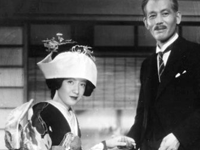
Ozu Yasujirô: Part II
"Tokyo Story" (Ozu Yasujirô, 1953)
Optional Readings:
David Bordwell, "Towards Intrinsic Norms" (Ozu and the Poetics of Cinema 73-108)
David Bordwell, "Tokyo monogatari" (Ozu and the Poetics of Cinema 328-33)
Kathe Geist, "Narrative Strategies in Ozu's Late Films" (Reframing 91-111)
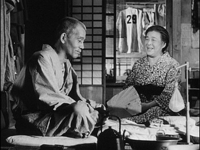
Kurosawa Akira: Part II
"Seven Samurai" (Kurosawa Akira, 1954)
Optional Readings:
Mitsuhiro Yoshimoto, "Seven Samurai" (Kurosawa 205-246)
D.P. Martinez, "Seven Samurai and Six Women" (Japanese Cinema: Texts and Contexts 112-123)

Kurosawa Akira: Part I
"Rashomon" (Kurosawa Akira, 1950)
Optional Readings:
Mitsuhiro Yoshimoto, "Japanese Cinema in Search of a Discipline" (Kurosawa 8-49)
Mitsuhiro Yoshimoto, "Rashomon" (Kurosawa 182-190)

Mizoguchi Kenji: Part I
"Osaka Elegy" (Mizoguchi Kenji, 1936)
Optional Readings:
Jacques Rivette, "Mizoguchi Viewed from Here" (Cahiers du Cinéma 81, March 1958)
Mori Toshie, "All for Money" (Japanese Cinema: Texts and Contexts 37-49)
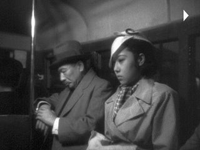
Mizoguchi Kenji: Part II
"Ugetsu" (Mizoguchi Kenji, 1953)
Optional Readings:
Alexandre Astruc, "What is mise en scène?" (Cahiers du Cinéma 100, October 1959)
Noël Burch, "Mizoguchi Kenji" (To the Distant Observer 217-46)
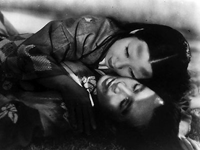
The Japanese New Wave: Part I
"Woman in the Dunes" (Teshigahara Hiroshi, 1964)
Optional Readings:
Mitsuyo Wada-Marciano, "Ethnicizing the Body and Film" (Japanese Cinema: Texts and Contexts 180-192)
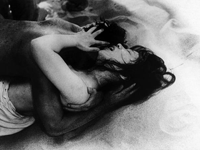
The Japanese New Wave: Part II
"Death by Hanging" (Ôshima Nagisa, 1968)
Optional Readings:
Maureen Turim, "Rituals, Desire, Death" (The Films of Oshima Nagisa 61-81)
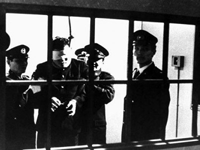
Sexuality, Violence, Politics: the Avant-Garde
"Throw away your Books, Rally in the Streets" (Terayama Shûji, 1971)
Optional Readings:
Carol Fisher Sorgenfrei, "Introduction" and "Cultural Outlaw in a Time of Chaos" (Unspeakable Acts 1-50)
Steve Ridgely, "Throw Out Your Books, Let's Hit the Streets" (The Poetics of Terayama Shûji 180-212)

Violence and Genre
"Battles without Honor and Humanity" (Fukasaku Kinji, 1973)
Optional Readings:
Richard Torrance, "The Nature of Violence in Fukasaku Kinji Jingi naki tatakai" (Japan Forum 17:3, 389-406)

Japanese Film Abroad: Part I
"Kwaidan" (Kobayashi Masaki, 1965)
Optional Readings:
Lafcadio Hearn, "The Reconciliation" from Shadowings (1900)
Lafcadio Hearn, "Yuki-Onna" and "The Story of Mimi-Nashi-Hoichi" from Kwaidan: Stories of Strange Things (1904)
Lafcadio Hearn, "In a Cup of Tea" from Kottô: Being Japanese Curios, with Sundry Cobwebs (1902)
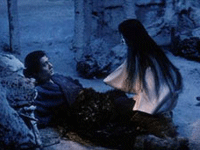
Japanese Film Abroad: Part II
"Tampopo" (Itami Jûzô, 1985)
Optional Readings:
Charles Shiro Inouye, "In the Show House of Modernity" (Word and Image in Japanese Cinema 126-48)
Michael Ashkenazi, "Food, Play, Business, and the Image of Japan in Itami Juzo's Tampopo" (Reel Food 27-40) [Incomplete -- not required reading]

Documentary: Part I
"Tokyo Olympiad" (Ichikawa Kon, 1965)
Optional Readings:
Eric Cazdyn, et al., "Tokyo Olympiad: A Symposium" (Kon Ichikawa, 315-338)
Satô Tadao, "Tokyo Olympiad: A Feeling of Richness in the Midst of Loneliness" (Kon Ichikawa, 129-133)

Documentary: Part II
"The Emperor's Naked Army Marches On" (Hara Kazuo, 1987)
Optional Readings:
Laura Marks, "'I Am Very Frightened by the Things I Film'" (Touch, 41-54)
Hara Kazuo, "The Film that Summons God" (Camera Obstrusa, 145-92)

Anime: Part I
"Akira" (Ôtomo Katsuhiro, 1987)
Optional Readings:
Ueno Toshiya, "Japanimation and Techno-Orientalism"
Thomas Lamarre,
"Born of Trauma: Akira and Capitalist Modes of Destruction"

Anime: Part II
"Spirited Away" (Miyazaki Hayao, 2001)
Optional Readings:
Rayna Denison, "The Global Markets for Anime" (Japanese Cinema: Texts and Contexts, 308-321)
Susan Napier, "Matter Out of Place:
Carnival, Containment, and Cultural Recovery in Miyazaki's Spirited Away" (Journal of Japanese Studies 32:2 [2006] 287-310)

18
19
Final Exam

